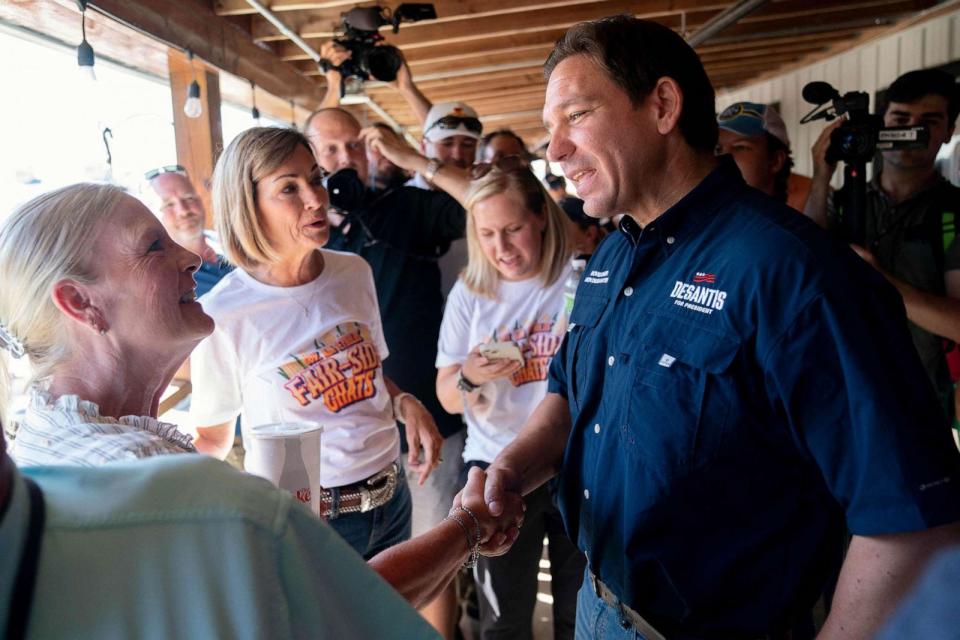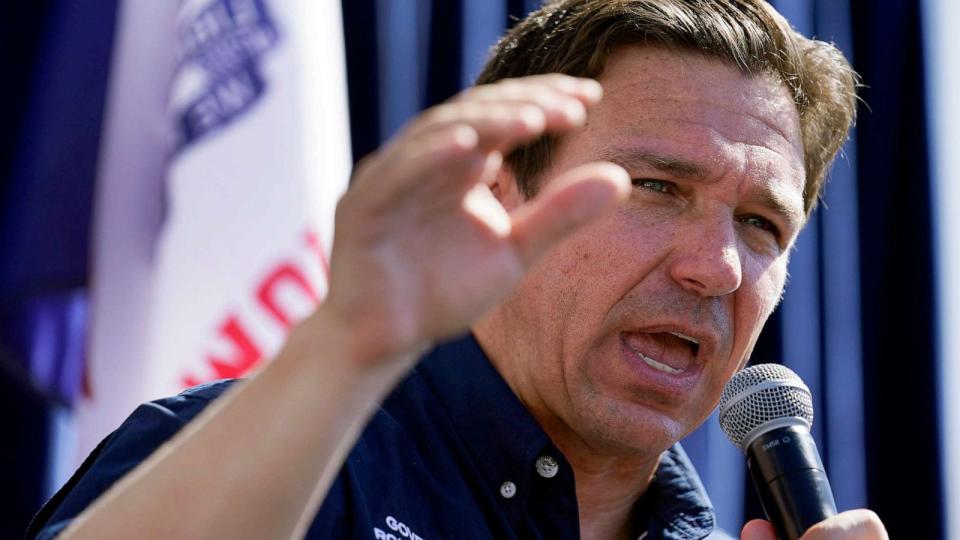How Ron DeSantis' campaign style has changed after early stumbles: Reporter's notebook
At a campaign stop at a restaurant in Atlantic, Iowa, last Friday, Ron DeSantis fielded questions from curious voters in the crucial early nominating state -- until a staffer announced that his time was drawing to a close.
Handing the microphone to one attendee, the aide noted that his would be the last question DeSantis could take from the shaded restaurant patio.
But the Florida governor moved right along after answering the question, about "woke"-ness in the military, and then turned to a man with his hand raised.
The question-and-answer session lasted another 10 minutes.
Extending time with voters is par for the course for presidential candidates. But for DeSantis, the moment in Atlantic was one of many in recent weeks that exemplifies the reset he hopes will reignite his bid for the White House. As one of the ABC News reporters "embedded" with DeSantis' campaign, I've attended many of his events and appearances, both before and after what his team acknowledges was a pivot this summer -- in staffing and in strategy.
DeSantis first entered the Republican primary in late May with loads of cash and goodwill among conservatives, having just won reelection in a famous swing state by nearly 20 points. Since the onset of the COVID-19 pandemic, he built a brand as a rising star in his party, with a penchant for political brawls over hot-button issues.
Within six weeks of his campaign launch, however, he spent some $8 million, according to financial filings, and decided to shed more than a third of his roughly 100 staffers, evaluating that he had hired -- and was spending -- too quickly in a primary season that will stretch into next summer.
MORE: DeSantis talks Trump, trans issues and 'what wokeness is'
DeSantis is still former President Donald Trump's closest primary challenger, according to FiveThirtyEight's national polling average, though he trails by nearly 40 points. Other rivals have also gained ground on him and one early problem has been replaced by another: While DeSantis wasn't catching up to Trump in May and June, his numbers have slowly but steadily been dropping since July.
For his part, DeSantis has cast his approach as regional, not national: "It's a state-by-state campaign," he recently told ABC News.
"The good thing about these first few states is you want to kick the tires," he said. "They want to be able to meet you."
FiveThirtyEight's polling averages in Iowa and New Hampshire show DeSantis usually in second place, too -- but still usually behind Trump by more than 20 points.
DeSantis has established a new rhythm in recent visits to both states: lots of stops across different counties, more questions from voters and increased access for the press. He gets from stop to stop in a bus plastered with his name on the sides.

The governor has appeared to start embracing the routine of retail politics -- intimate events in rural towns, which experts say is key to earning the votes of residents of the first two states in the GOP nominating calendar.
"Iowa caucus voters, they're used to knowing and meeting and shaking hands and taking pictures with the people that they're going to vote for," Cody Hoefert, a former co-chair of the Iowa Republican Party, told ABC News.
"They're used to that one-on-one attention."
Hoefert, who has yet to endorse a candidate, said DeSantis has been the most aggressive grassroots campaigner in Iowa so far. "It's not even close," he said.
DeSantis has said he plans to visit all 99 counties in Iowa and predicts he'll meet that goal this fall. He visited eight over two days last week, bringing him more than a third of the way there.
"We're going to continue to take the case directly to the voters," he said after shaking hands at a restaurant in Tipton on Thursday, a city of roughly 3,000 people some 50 miles southeast of Cedar Rapids.
"We're going to things where candidates typically don't go, and I think that shows the commitment to earning the votes of people," he added. "I am not entitled to anybody's support. You've got to earn that support, and that's what we're going to do in Iowa."
The strategy is aimed at voters like Tiffany Welch, a 43-year-old retail worker from Clive who said she appreciated the governor's answer to her question about child care support at a town hall in Panora on Friday but remains undecided in the primary.
MORE: Inside DeSantis' debate prep: Meeting with coach, prepping weekly
"I try to hear as many [candidates] as I can," she said after the event. "I've lived in Iowa for 16 years. I'm several caucus cycles into this and I absolutely love being engaged in this. I take my access to candidates seriously."
The governor did not always campaign this directly.
In the first weeks of his 2024 candidacy, DeSantis, in swings through the early nominating states, kept his distance from voters and the media. He conversed with attendees after speeches but drew criticism for not taking their questions from the stage.
He rarely gave news outlets a formal setting to ask him questions, forcing reporters to try to get his attention as he exited events.
Iowa Senate President Amy Sinclair said she noticed DeSantis was "a little stiff" in those initial visits.
"I told him to relax," Sinclair, who has endorsed the governor and joins him often on the trail, told ABC News. "And I think he has."
On a recent trip to the state, she recounted, DeSantis spontaneously chose to stop at a convenience store and speak to voters.
"We were in my district and it was his idea to just stop at Casey's and talk with people, which he did," she said, noting a man in the store approached her afterward and suggested the governor had won him over.

As DeSantis' approach has changed, so have the people ushering him around.
Never Back Down, the super PAC that has raised more than $100 million to boost DeSantis' candidacy, has run much of the governor's ground game the last several weeks, taking the reins from the campaign.
The group has organized three bus tours since late July, carefully advertising DeSantis as a "special guest" to avoid breaching federal elections laws, which prohibit coordination between candidates and these kinds of political action committees.
Most stops involve a formal question-and-answer session with voters, and some feature short press conferences afterward with reporters.
The increased media access has also meant increased scrutiny, occasionally turning passing moments into fodder for critics.
Last month, when touring the Wayne County fairgrounds, DeSantis told a girl eating a snow cone, "That's probably a lot of sugar, huh?"
The clip went viral, fueling detractors who call the governor too awkward to win over the electorate.
Then, with swarms of cameras following him at the Iowa State Fair in Des Moines on Saturday, DeSantis absorbed heckles from fairgoers, including from a group by the pork tent that chanted, "We want Trump!"
When a man shouted "meatball" in his direction, referencing a derogatory nickname, two people trailing the governor with "DeSantis 2024" signs in the air laughed.
"What a funny insult," one of them said.
DeSantis, meanwhile, trudged ahead.
The governor's allies insist the verbal slings and arrows don't faze him, invoking some of the same culture warrior vocabulary that first catapulted him into the GOP spotlight.
"He's got a core," Keith Rothfus, a former Pennsylvania congressman who served with DeSantis in the U.S. House of Representatives and knows him well, told ABC News.
"What's the word? He's based," Rothfus said. "He knows what he wants to do. He knows the straits that we're in. That kind of stuff isn't going to bother him at all."
How Ron DeSantis' campaign style has changed after early stumbles: Reporter's notebook originally appeared on abcnews.go.com


